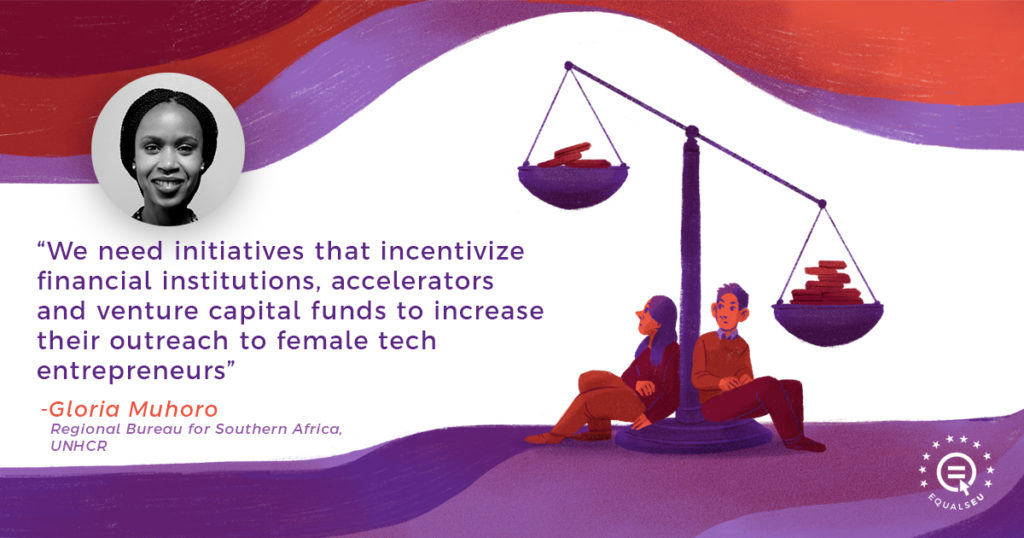On the occasion of International Women’s Day 2021, we talked to Gloria Muhoro, an International Development Expert and Gender-Mainstreaming Specialist.
Gloria Muhoro is an International Development Expert with 10 years’ experience designing and managing multi-million dollar projects and programs with governments, civil society and development partners in inclusive innovation, women and girl’s socio-economic empowerment, and youth skills development across Africa. She is an experienced gender-mainstreaming specialist having worked in 54 regional member countries to lead the work on gender and technology while working for the African Development Bank. Currently, she works as a Senior Development Officer, Regional Bureau for Southern Africa at UNHCR.

Why do you think Gender Inclusive Investment is important?
Women form the backbone of African economies, accounting for a majority of small- and medium-sized businesses. There is, therefore, an economic imperative to supporting their growth. It also makes business sense. Research shows that if women can unlock the constraints that inhibit the growth of their businesses and gain access to finance, they achieve more in terms of capital utilization, generating higher revenues and a better return on investment.
How would the world today compare to the world in the future if we could achieve gender equality in investment?
Women would have more control of and use productive assets, hence access to finance, which they can use to start and grow their businesses. This would mean more development, less poverty and better healthcare, nutrition, education, and well-being for them, their families, and their children and the community at large.
What are the biggest challenges in Gender Inclusive Investment today?
One of the biggest challenges is the funding gap, and there are multiple reasons for it. For one, female entrepreneurs have fewer networking (and ultimately fundraising) opportunities. There is also a higher perceived risk of lending to women entrepreneurs and unconscious bias in investor decision-making towards female entrepreneurs.
Lack of gender diversity on investment boards is also contributing to the funding gap. Men dominate the venture capital world, with women holding only 10 percent of all senior positions in private equity and venture capital firms globally. There is a direct correlation between the number of female investors and that of female investees. The familiarity principle posits that people tend to gravitate to what is familiar or that which they identify with, so men end up investing in other men.
Inadequate business management skills and a lack of support from enterprise support organizations are further obstacles for female entrepreneurs. Recent research by IFC indicates that accelerators – entities designed to train and support the development of start-ups to become investment-ready – actually seem to increase the gender-financing gap for female entrepreneurs.
Where do you see the greatest opportunity of improvement in Gender Inclusive Investment?
To address the supply-side constraints of funding, we need initiatives that incentivize financial institutions, accelerators and venture capital funds to increase their outreach to female tech entrepreneurs. On the investee side, we need initiatives that enhance female tech entrepreneurs’ technical capacity to help build a pipeline of investor-ready companies led by women.
In the medium to long term, these ecosystem-wide interventions will be key:
- Address underlying barriers among incubators, accelerators and investors related to risk perception, closed networks or unconscious bias at institutional, strategic, programmatic and process levels. For instance, companies can review their internal investment identification and decision-making systems for potential biases against women.
- Advocate for greater gender diversity in investment boards and encourage more women to enter the investment space, especially at decision-making levels.
- Increase the pipeline of female talent in tech entrepreneurship. To do this, we must make tech entrepreneurship more attractive and relevant for women and girls, provide mentors and support networks for aspiring female entrepreneurs, increase the visibility of female role models (as entrepreneurs and investors) and host more “women in tech” roundtables with female tech founders who have successfully raised funding to share their experiences.
- Be bold in our actions and ambitions to change social norms and attitudes about women’s and girls’ participation in male-dominated or technical roles.
These actions will help level the playing field for female tech entrepreneurs and encourage their participation in the sector – ensuring they are provided with the resources and opportunities to contribute equally to job creation, poverty reduction and economic growth.